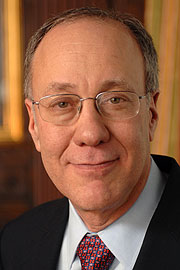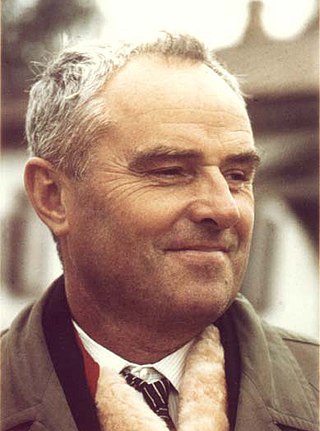
Leonid Vitalyevich Kantorovich was a Soviet mathematician and economist, known for his theory and development of techniques for the optimal allocation of resources. He is regarded as the founder of linear programming. He was the winner of the Stalin Prize in 1949 and the Nobel Memorial Prize in Economic Sciences in 1975.
Sergei Petrovich Novikov was a Soviet and Russian mathematician, noted for work in both algebraic topology and soliton theory. He became the first Soviet mathematician to receive the Fields Medal in 1970.

Mechanism design, sometimes called implementation theory or institutiondesign, is a branch of economics, social choice, and game theory that deals with designing game forms to implement a given social choice function. Because it starts with the end of the game and then works backwards to find a game that implements it, it is sometimes described as reverse game theory.
The Keldysh Institute of Applied Mathematics is a research institute specializing in computational mathematics. It was established to solve computational tasks related to government programs of nuclear and fusion energy, space research and missile technology. The Institute is a part of the Department of Mathematical Sciences of the Russian Academy of Sciences. The main direction of activity of the institute is the use of computer technology to solve complex scientific and technical issues of practical importance. Since 2016, the development of mathematical and computational methods for biological research, as well as a direct solution to the problems of computational biology with the use of such methods, has also been included in the circle of scientific activities of the institute.

Albert Nikolayevich Shiryaev is a Soviet and Russian mathematician. He is known for his work in probability theory, statistics and financial mathematics.

Automation and Remote Control is a Russian scientific journal published by MAIK Nauka/Interperiodica Press and distributed in English by Springer Science+Business Media.

Leonid Hurwicz was a Polish–American economist and mathematician, known for his work in game theory and mechanism design. He originated the concept of incentive compatibility, and showed how desired outcomes can be achieved by using incentive compatible mechanism design. Hurwicz shared the 2007 Nobel Memorial Prize in Economic Sciences for his seminal work on mechanism design. Hurwicz was one of the oldest Nobel Laureates, having received the prize at the age of 90.

Roger Bruce Myerson is an American economist and professor at the University of Chicago. He holds the title of the David L. Pearson Distinguished Service Professor of Global Conflict Studies at The Pearson Institute for the Study and Resolution of Global Conflicts in the Harris School of Public Policy, the Griffin Department of Economics, and the College of the University of Chicago. Previously, he held the title The Glen A. Lloyd Distinguished Service Professor of Economics. In 2007, he was the winner of the Sveriges Riksbank Prize in Economic Sciences in Memory of Alfred Nobel with Leonid Hurwicz and Eric Maskin for "having laid the foundations of mechanism design theory". He was elected a Member of the American Philosophical Society in 2019.

Alexey Ivakhnenko was a Soviet and Ukrainian mathematician most famous for developing the group method of data handling (GMDH), a method of inductive statistical learning, for which he is considered as one of the founders of deep learning.

Alexander Yakovlevich Lerner was a scientist and Soviet refusenik.

The Institute of Oriental Studies of the Russian Academy of Sciences, formerly Institute of Oriental Studies of the USSR Academy of Sciences, is a Russian research institution for the study of the countries and cultures of Asia and North Africa. The institute is located in Moscow, and formerly in Saint Petersburg, but in 2007 the Saint Petersburg branch was reorganized into a separate Institute of Oriental Manuscripts.
Olga Kharlampovich is a Russian-Canadian mathematician working in the area of group theory. She is the Mary P. Dolciani Professor of Mathematics at the CUNY Graduate Center and Hunter College.

Anton V. Zorich is a Russian mathematician at the Institut de mathématiques de Jussieu. He is the son of Vladimir A. Zorich. He received his Ph.D. from Moscow State University under the supervision of Sergei Novikov.
YuriiVladimirovich Egorov was a Russian-Soviet mathematician who specialized in differential equations.
Faina Mihajlovna Kirillova was a Belarusian scientist in the field of mathematical theory of optimal control. She was the winner of the USSR Council of Ministers Prize (1986) "for the development and implementation of multi-purpose software tools for engineering calculations."

Numan Yunusovich Satimov was a Soviet and Uzbek mathematician, Doktor Nauk in Physical and Mathematical Sciences, academician of the Academy of Sciences of Uzbekistan (2000), and corresponding member of the Academy of Sciences of UzSSR from 1979 to 2006, and a laureate of the Biruni State Prize (1985). He was a specialist in the theory of differential equations, control theory and their applications.
Leonid Isakovich Manevitch was a Soviet and Russian physicist, mechanical engineer, and mathematician. He made fundamental contributions to areas of nonlinear dynamics, composite and polymer physics, and asymptotology.
Vladimir Emelyanovich Neuvazhaev was born in 1935. He is a Soviet and Russian specialist in the field of computational mathematics, Doctor of Physics and Mathematics (1972), professor (1989), USSR State Prize Laureate (1972), and Honored Scientist of the Russian Federation (2006).
Antisemitism in Soviet mathematics was a manifestation of hostility, prejudice and discrimination in the Soviet Union towards Jews in the scientific and educational environment related to mathematics.











